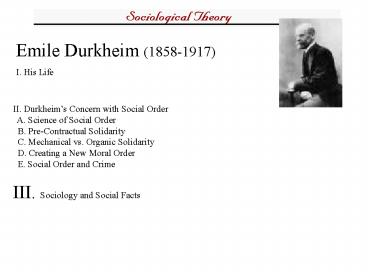Emile Durkheim 18581917 - PowerPoint PPT Presentation
1 / 15
Title:
Emile Durkheim 18581917
Description:
Social solidarity must precede contracts and cooperation ... Cooperation (Contracts) Society. Individual. Not vice versa! Mechanical vs. Organic Solidarity ... – PowerPoint PPT presentation
Number of Views:1225
Avg rating:3.0/5.0
Title: Emile Durkheim 18581917
1
Emile Durkheim (1858-1917) I. His Life
II. Durkheims Concern with Social Order A.
Science of Social Order B. Pre-Contractual
Solidarity C. Mechanical vs. Organic
Solidarity D. Creating a New Moral Order E.
Social Order and Crime III. Sociology and Social
Facts
2
Durkheims Life The Contrast with Marx
- Both come from Jewish backgrounds
- Both grow up in multicultural areas (German and
French) - Durkheim climbs French ladder of success. Gains
respectability. - Marx suffers political and ethnic
discrimination. Spends adult life in exile.
3
Durkheims Life The Contrast with Marx
- Marx develops a theory of revolutionary change.
A socialist. - Durkheim strives to develop a science of social
order. A liberal reformist.
4
- A Science of Social Order
- Why did Durkheim define social order as the main
problem facing society? - Comtes Legacy Science and moral order
5
Pre-Contractual Solidarity (see pp. 94-96)
- A critique of Liberal views that society is
based on rational self-interest - Social solidarity must precede contracts and
cooperation - Society ultimately rests on non-rational
foundations (a moral order)
6
IndividualCooperation (Contracts)
Social Solidarity
Society
Individual
Not vice versa!
7
Mechanical vs. Organic Solidarity
8
The Shift from Mechanical to Organic Solidarity
- A long-term historical trend associated with the
increasing division of labor - A positive thing
- Both continue to coexist
- Organic solidarity imperfectly attained
significant reforms needed
9
The social questionis not a question of money
or of force it is a question of moral agents.
What dominates it is not the state of our
economy, but rather the state of our morality.
- A contrast to Marx
- But an insistence that a new moral order could
only arise from a society that offered equal
opportunity - This led Durkheim to some quite radical
proposals, such as the abolition of inheritance.
10
Social Order and Crime Crime brings together
honest men and concentrates them. There is,
then, no phenomenon that represents more
indisputability all the symptoms of normality,
since it appears closely connected with the
conditions of all collective life. We must not
say that an action shocks the collective
conscience because it is criminal, but rather
that it is criminal because it shocks the
collective conscience. We do not condemn it
because it is a crime, but it is a crime because
we condemn it. --Durkheim quotes from Crime
webpage at The Durkheim Archive
11
Summary so far
- Society is a moral order, it rests on
non-rational foundations, including trust and a
sense of justice. It cannot rest on individual
self-interest alone. - The nature of social solidarity was changing.
- Durkheim felt that the new, organic solidarity
was being threatened by the social changes of his
day - He felt that quite radical reforms were required
to restore social solidarity and social order
12
- Durkheims Manifesto for Sociology
- Sociology is the study of social facts
- Consider social facts as things
- Explain social facts by other social facts
13
Sociology as the Study of Social Facts A social
fact is every way of acting, fixed or not,
capable of exercising on the individual an
external constraint or again, every way of
acting which is general throughout a given
society, while at the same time existing in its
own right independent of its individual
manifestations.
- an attribute of society
14
Consider social facts as things
- social facts have their own reality, not physical
but still thing-like - social facts must be approached objectively and
scientifically, just like the study of things
15
Explaining Social Facts
- Social facts are what sociology seeks to explain
- Social facts must be explained by other social
facts - Must not confuse different levels of analysis































